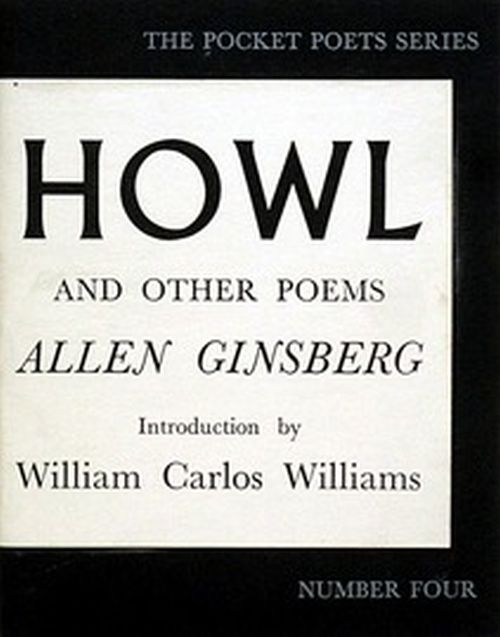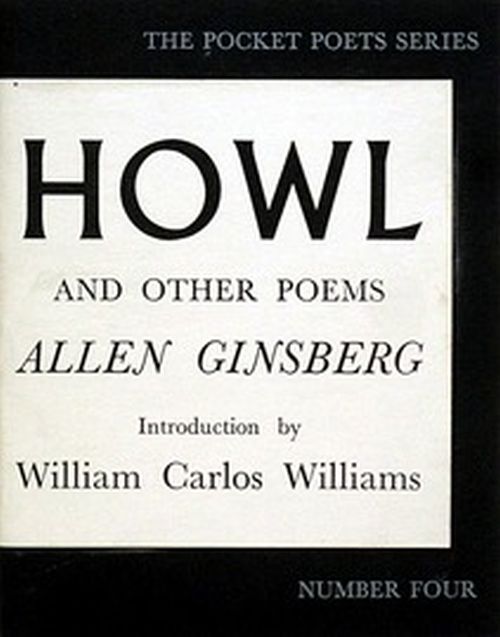Scandalum Scandalorum

The name of Allen Ginsberg may not be familiar to younger readers, but for a relatively brief period, right at the beginning of that cultural revolution whose evil consequences we are still struggling with, he was regarded as something of a literary giant. Along with his sometime friend and colleague Jack Kerouac, he was one of the founders of the “beat” movement — which contained within itself the seeds of all subsequent “liberations” (as they were then called) from traditional social norms and constraints. In 1956, when Ginsberg burst upon the cultural scene with his long, free-verse poem called Howl, these now old-fashioned norms were still regarded as the products of “Western civilization” — and Western civilization was something which Ginsberg, like his drug-addled hippie successors of a decade later, regarded as a form of social pathology. Howl, whose title perfectly conveys all you need to know of its contents, begins thus:
I saw the best minds of my generation destroyed by madness, starving hysterical naked,
dragging themselves through the negro streets at dawn looking for an angry fix,
angelheaded hipsters burning for the ancient heavenly connection to the starry dynamo in the machinery of night. . .
And so it continues through a massive 2000-word sentence consisting of one absurd and absurdly extended relative clause after another, all beginning with “who” and describing some kind of self-destructive behavior to which being born into the uptight American middle classes of the mid-20th century had supposedly driven his fallen angels. My favorite is this one:
who cut their wrists three times successively unsuccessfully, gave up and were forced to open antique stores where they thought they were growing old and cried.
As Oscar Wilde said of the death of Little Nell in Dickens’s Old Curiosity Shop, you’d have to have a heart of stone not to laugh at it.
But it turns out that the angelheaded hipsters of the 1950s didn’t know how good they had it. At least most of them seem to have got some excitement out of their descent into madness. Now it’s different. I sometimes think that the best minds of my generation have instead been driven mad by the indescribable tedium of having to employ their highly-trained intellects in the forensic examination of such matters as the moral and legal niceties of, and potential consequences for, presidents (and vice-presidents!) who take classified documents home with them. As an example of an unprofitable waste of mental and spiritual life, I think this would be hard for a latter-day Allen Ginsberg to top.
I know that this view of the great classified documents scandal(s) of 2022-2023 makes me an outlier, to say the least, among media folk. Perhaps I myself should be classified as one of that disreputable lot of romantics who admire rule-shattering political buccaneers like Donald Trump or Boris Johnson and who, according to Daniel Finkelstein of The Times of London, “actually like rule-breaking.” I deny it. I just think national leaders usually have more important things to worry about — like, say, national survival — and ought to be cut some slack when it comes to the following of bureaucratic rules, particularly when it takes highly trained legal specialists to explain to us what the rules are.
What’s missing in such scandal-mongering is a sense of proportion. I made a similar point in these pages just a year ago (see “World-shaking events” in The New Criterion of March, 2022) when British parliamentarians of both parties were trying to purge Mr Johnson, the Conservative prime minister at the time, for the scandal of partaking of a bit of birthday cake at the other kind of party, or parties, during lockdown — when, of course, such parties were forbidden by his own government. I thought that Lord Finkelstein in the column mentioned above, on the latest scandal tarnishing the reputation of Britain’s Tories, was going to do something similar when he began it by writing of the mess in which Winston Churchill found his personal finances for most of his life, and the sort of rule-breaking (or at least rule-bending) that was necessary for him to repair them.
Not at all! Instead he somehow managed to see the extracurricular activities of the war-time savior of Britain as all the more reason why his successors in No. 10 Downing Street should be bound ever tighter to a strict observance the ethical watchdogs’ rules. I think that Lord F., who used to be some kind of political operative, must have spent too long in the media hothouse, where they purport to believe that the faithful observance of every punctilio of the law which a chief magistrate is ostensibly there to enforce is the most appropriate measure of his legitimacy in office.
Except that no one really does believe that. It only suits us to pretend to believe it when the supposed prime ministerial or presidential scofflaw belongs to a different party from our own, or is otherwise someone we wish to drive from office (or render impotent within it) by crying scandal. The alleged scandal of Mr Biden’s secret documents was naturally seized on by Republicans intoxicated with the prospect of playing and winning the Democrats’ own scandal game. They should have recognized that it’s those with the media on their side who always win that game. It would have suited the occasion better for them to have looked at how the best minds of several generations of politicos on both sides of the ideological fence were employed in parsing the subtlest of differences in culpability between President Biden’s and former President Trump’s possession of secret documents and said, “This is no way to run a government.”
How could it not be obvious to anyone with a sense of due proportion that here was the reductio ad absurdum of the media’s scandal culture? A more profitable line of inquiry for the legal beagles sniffing out putative wrong-doing for the benefit of the media’s scandal machine would be to ask why the laws pertaining to classified documents, like the tax laws, have been written with such labyrinthine complexity in the first place? I think we can guess the answer to that question from the arbitrariness with which such laws, like those against riot and affray, are enforced. Already all but the most naive among us must assume that the prosecution of any prominent public figure, or his being given the scandal-treatment by the media, must be politically motivated.
Here, for instance, is a paragraph from the obituary of the late Cardinal Pell which appeared in The Times of London at about the same time that the Biden classified documents scandal, such as it was, was at its height in America.
Reaction to Pell’s legal travails exemplified how he was a polarising figure in the church. To conservatives who loved his doctrinal muscularity on issues such as abortion and same-sex marriage, he was a hero who had been “framed” for trying to put the church’s shameful financial affairs in order. To those of a more liberal bent, he was a reactionary hypocrite who got what was coming to him.
“Framed,” in other words, can be written with quotation marks or without, according to your political tastes. The anonymous obituarist can hardly be alone in taking this for granted. The guilt or innocence of any public figure accused of crime or serious immorality is to most people, or at least to most people in the media, positively correlated with their own political views. In Cardinal Pell’s case, this was also evident throughout his “legal travails,” which included more than a year in prison before his final acquittal on a charge of pedophilia — trumped up, presumably, by some of the alarming number of his fellow Australians who already supposed him to be “a reactionary hypocrite who got what was coming to him.”
In our own country Justice, a documentary film purporting to adduce new evidence about the sexual behavior of Supreme Court Justice Brett Kavanaugh in his college days, premiered at the Sundance Film Festival. Byron York who hadn’t seen the film himself, commented that
It appears the main point of Justice is that there are all sorts of credible accusations against Kavanaugh that the Senate did not investigate during the confirmation fight. But even friendly reviewers have noted that the filmmakers have not found those stories. Indeed, it appears that years of investigating, first by Senate Democrats, then by friendly journalists, and now by friendly moviemakers, have all served to illustrate how flimsy the accusations against Kavanaugh were.
From the start, Justice Kavanaugh’s several accusers never bothered to pretend that their coming forward with unproven and unprovable accusations against him had any other purpose than keeping him off the court by any means necessary — or getting him off it now that he is on it. “Brett Kavanaugh Doc Should Compel FBI to Reopen Investigation,” wrote Christian Blauvelt for IndieWire — of the documentary — just as he and many another of his kind would most certainly have written long before it was ever made. Who doesn’t know by now that scandal — or, for that matter, non-scandal — in the media’s hands always has a political object and is never simply a disinterested adumbration of the truth?
“Some things that your party tells you are false,” tweeted Elon Musk the other day, “and some things that the other party says are true.” There was a time when this would have seemed like the merest common sense, but now it appears to be very uncommon sense indeed. Now we are all more likely to agree with Prince Harry, Duke of Sussex, that “There’s just as much truth in what I remember and how I remember it as there is in so-called objective facts.”
It can be no accident, therefore, that “so-called objective facts” appear to be in trouble everywhere these days. In an op-ed column in The Washington Post in January, the paper’s former executive editor, Leonard Downie Jr. maintained that “Newsrooms that move beyond ‘objectivity’ can build trust.” Trust, forsooth. He notes that,
increasingly, reporters, editors and media critics argue that the concept of journalistic objectivity is a distortion of reality. They point out that the standard was dictated over decades by male editors in predominantly White newsrooms and reinforced their own view of the world. They believe that pursuing objectivity can lead to false balance or misleading “bothsidesism” in covering stories about race, the treatment of women, LGBTQ+ rights, income inequality, climate change and many other subjects. And, in today’s diversifying newsrooms, they feel it negates many of their own identities, life experiences and cultural contexts, keeping them from pursuing truth in their work.
The word “truth” there is presumably accompanied by an understood possessive: i.e. their truth — which, like Prince Harry’s (or that of Justice Kavanaugh’s accusers), requires no objective correlative. No wonder they have no time for objectivity! It seems that we must add that word to the growing number of those — like “lie”, “democracy”, “insurrection”, “racism” etc. — whose meanings in the vocabulary of the left has changed. And just as “racism” now means “anti-racism” (and “anti-racism” means “racism,” in its old sense), so does “objectivity” mean non-objectivity, a “misleading ‘bothsidesism’” that is “a distortion of reality” — the word “reality,” like “truth,” signifying a private state of mind and so requiring an understood possessive.
It must have taken some such privatized reality, too, to produce Mr Downie’s contention that, as the Post’s editor, “My goals for our journalism were instead [i.e. instead of objectivity] accuracy, fairness, nonpartisanship, accountability and the pursuit of truth.” Is it possible that he really believes this, even with, to be charitable, a silent reservation that he never lived up to such goals? He certainly intends for us to believe he believes it. But his purpose here is to inform readers that, with the help of a colleague and a grant from the Stanton Foundation, he has been investigating “the values and practices in mainstream newsrooms today,” and that the results of this investigation have convinced him, along with Emilio Garcia-Ruiz, editor in chief of the San Francisco Chronicle, that “Objectivity has got to go.” In his own words he writes that “truth-seeking news media must move beyond whatever ‘objectivity’ once meant to produce more trustworthy news.”
He thus affects not to know that “whatever objectivity once meant” was, precisely, more trustworthy news, news unbiased by its reporters’ own political opinions. You might almost say that, at a time when polls show that public trust in the media is already at an all-time low, far from announcing that objectivity has got to go, “a transparent, unbiased, and accountable media is more needed than ever.” The words are those of Jeff Gerth a former investigative reporter with The New York Times who, on the same day that Mr Downie’s op ed appeared, began a series in The Columbia Journalism Review on how the idea that “objectivity has got to go” worked out for the media in reporting on the Trump “Russiagate” scandal.
Spoiler alert! The answer is not so well. Not, in fact, well at all.
It will of course come as no news to readers of this journal that the Russia collusion story, cooked up by Hillary Clinton to destroy the presidency of Donald Trump, was a lie from beginning to end, or that the media who ran with it for two and a half years had to have known it was a lie. But Mr Gerth appears to agree with Bob Woodward, whom he quotes as saying only that Russiagate “wasn’t handled well,” and that the media must “walk down the painful road of introspection” in order to figure out what went wrong. This, writes Jeff Gerth in his own voice, amounts to the fact that “news outlets and watchdogs haven’t been as forthright [as Donald Trump] in examining their own Trump-Russia coverage.”
Assuming that such a jaw-dropping understatement is not an attempted witticism, it betrays a similar lack of a sense of proportion to that of the scandal-hunters themselves, always blind to the scandalousness, by any objective standard, of their own behavior. That has to be why objectivity has got to go. But how can Leonard Downie Jr. not know that objectivity went long ago? He knows it all right. Everybody knows it. But not everybody cares.
I cannot do better than give the final word on Jeff Gertz’s exposé to Eddie Scarry of The Federalist, author of Liberal Misery: How the Hateful Left Sucks Joy Out of Everything and Everyone:
No amount of “painful road of introspection” can fix what the media, conspiring with the Democratic Party and the permanent Washington bureaucracy, did to this country and to American democracy. They beat a terrifying lie — a sitting president as an asset of a foreign adversary — into the public consciousness for more than two years, crippling the political agenda Trump was duly elected to enact and, certainly, aiding in the denial of a second term in office. But look! Here’s a renowned journalist giving them a stern talking- to! Nobody cares. It’s over. They won. And they’ve never stopped. As horrid as the media was pre-Trump, its shortcomings were mostly recognized as “liberal bias.” What they did beginning in 2017 and ever since isn’t bias. It’s dishonest. It’s malicious. It’s evil.
The hell-hole that Allen Ginsberg and his fellow beatniks saw in the America of the 1950s has finally come to pass — at least in the world of the American media. Now, we have to believe, it’s coming for the rest of us.
Discover more from James Bowman
Subscribe to get the latest posts to your email.






